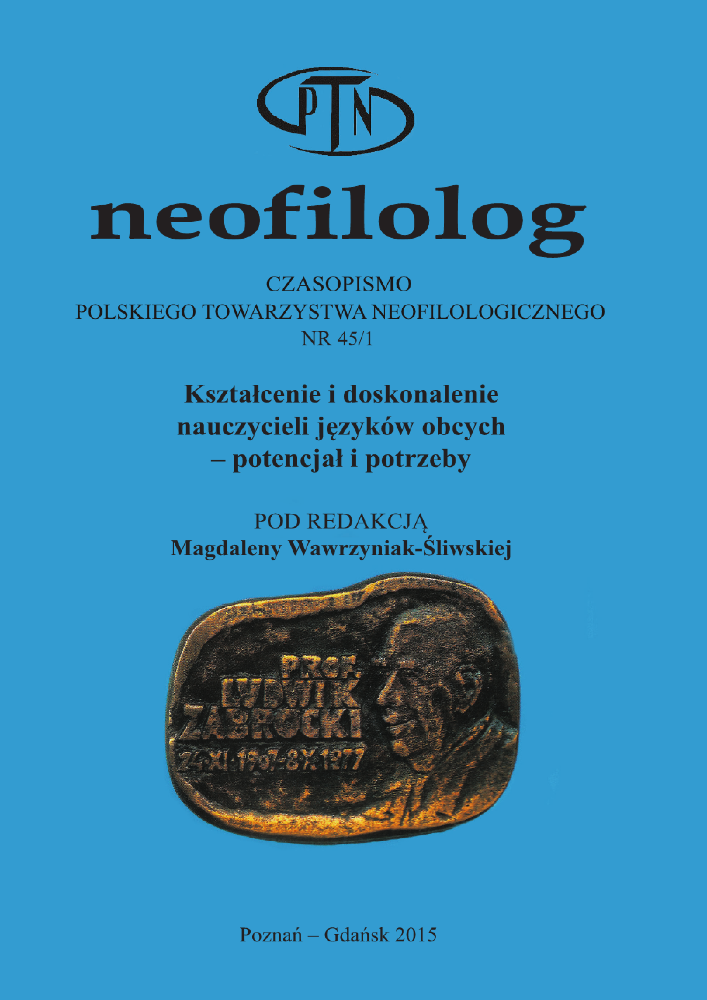Résumé
Reflection in teacher development is important as it can help both experienced
and novice teachers to better understand the processes they
are involved in. It can also be used to aid evaluation processes. This paper
presents a small scale study that involved undergraduate English
philology students from Gdańsk University who were studying for the
teacher specialisation. One of its purposes was to trial a strategy for
feedback that could be used to mediate an already existing model of
assessment for students’ taught lessons, which previous to the study
used only a prescribed set of assessment criteria. Another purpose was
to promote a reflective turn in both the student-teacher and academic
mentor (myself), which would then inform the discussions that took
place after each observed lesson. In addition to this, I was interested to
find out if this strategy would generate a suitable quality and quantity
of information, so that it might be used for further research. Overall,
the strategy proved a useful aid to reflection in relation to the students’
teaching practices. As a research tool, it also generated usable data.
Références
Bruner, J. 1996. The Culture of Education. Cambridge: Harvard University Press.
Galewska-Kustra, M. 2009. „Studium przypadku w pedagogicznych badaniach nad twórczością. W poszukiwaniu praktycznych zastosowań metody” (w) Metody pedagogicznych badań nad twórczością. Teoria i empiria (red. K.J. Szmidt). Łódź: Wydawnictwo Akademii Humanistyczno-Ekonomicznej w Łodzi: 225-275.
Heron, J. Reason, P. 1997. „A participatory inquiry paradigm”. Qualitative Inquiry 3(3): 274-294.
Kębłowska, M. 2006. „Transferring ELT knowledge to the classroom – results of a study”. Glottodidactica 32: 159-171.
Mann, S. 2004. „Evaluation” (w) Adults learning languages: A CILT guide to good prac-tice (red. H. Harnisch i P. Swanton). London: CILT:113-129.
Mann, S. i Walsh, S. 2015. „Reflective dimensions of CPD: supporting self-evaluation and peer-evaluation” (w) Teacher evaluation in second language education (red. H. Donaghue i A. Howard). London: Bloomsbury Academic: 17-34.
Mead, G.H. 1962. Mind, Self and Society: From the Standpoint of a Social Behaviourist. Chicago: The University of Chicago Press.
Mercado, L. A. i Mann, S. 2015. „Mentoring for teacher evaluation and development” (w) Teacher evaluation in second language education (red. H. Donaghue i A. Howard). London: Bloomsbury Academic: 35-54.
Schwandt, T.A. 1994. „Constructivist, interpretivist approaches to human inquiry” (w) Handbook of qualitative research (red. N.K. Denzin i Y. S. Lincoln). London: Sage Publications: 118-137.
Sullivan, H. S. 1953. The Interpersonal Theory of Psychiatry. New York: W.W. Norton & Company, Inc.
Wallace, M.J. 2008. Action Research for Language Teachers. Cambridge: Cambridge University Press.
Witkowski, L. 2007. „Kwadratura aksjologicznego AIDS w pedagogice” (w) Edukacja wobec sporów o (po)nowoczesność (red. L. Witkowski). Warszawa: Instytut Ba-dań Edukacyjnych: 141-152.
van Teijlingen, E. R. i Hundley, V. 2001. „The importance of pilot studies”. Social Re-search Update 35. http://sru.soc.surrey.ac.uk/SRU35.html DW 11.10.2014
Licence
© Neofilolog 2019

Ce travail est disponible sous licence Creative Commons Attribution - Pas de Modification 4.0 International.
Auteurs :
Les auteurs de textes acceptés pour publication dans la revue Neofilolog sont tenus de remplir, signer et renvoyer à l'adresse de la rédaction, un accord sur l'octroi d'une licence gratuite pour les œuvres, avec obligation d'accorder une sous-licence CC.
En vertu de cet accord, les auteurs des textes publiés dans la revue Neofilolog accordent à l'Université Adam Mickiewicz de Poznań une licence non exclusive et gratuite et permettent l'utilisation de la sous-licence Creative Commons Attribution-NoDerivatives 4.0 International (CC BY-ND 4.0).
Les auteurs se réservent le droit de disposer librement de l'œuvre.
Utilisateurs :
Les utilisateurs d'Internet intéressés ont le droit d'utiliser les œuvres publiées à partir de l'année 2017 sous réserve des conditions suivantes :
- reconnaissance de la qualité d'auteur - l'obligation de fournir des informations sur la qualité d'auteur, le titre, la source (liens vers l'œuvre originale, DOI) et la licence, ainsi que l'œuvre distribuée ;
- sans créer d'œuvres dérivées - l'œuvre doit être conservée dans sa forme originale, p. ex. les traductions ou les interprétations ne peuvent être distribuées sans le consentement de l'auteur.
Tous les textes publiés sont soumis au droit d'auteur.
Autres :
L'Université Adam Mickiewicz de Poznań se réserve le droit à la revue dans son ensemble (mise en page, forme graphique, titre, conception de la couverture, logo, etc.).
.
